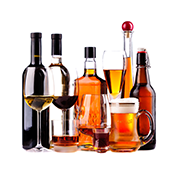
Tax Guide for Alcoholic Beverage Tax
New Information
Starting January 1, 2026, Assembly Bill 1246 [Stats. 2025, ch. 295] made several changes to the Alcoholic Beverage Tax Program, including:
- A winegrower may possess and transport brandy for the purpose of storing the brandy to age on the winegrower's premises.
- A craft distiller may transport brandy to and from the premises of a licensed winegrower for the purpose of storing the brandy to age on the winegrower's premises.
- A licensed craft distiller may sell up to 4.5 liters, increased from 2.25 liters, of prepackaged containers of the licensee's spirits per day per consumer at its premises.
- For calendar year 2026, a Type 94 Direct Shipper permit issued by Department of Alcoholic Beverage Control (ABC), will be required for California craft distillers or qualifying out-of-state distillers to ship spirits they manufacture or produce directly to California consumers. To learn more about the Type 94 Direct Shipper permit, please visit ABC's industry advisory notice.
If you are required to obtain a Type 94 Direct Shipper permit, you must register for an alcoholic beverage account with us, file returns, and pay the appropriate alcoholic beverage taxes. Additionally, if you do not currently have a California seller's permit, you must register for one with us. You may visit our online services webpage to register for your alcoholic beverage account and a seller's permit.
Please continue to check back for more updates to our website. We will send notices to affected account holders soon.
Helping your business succeed is important to the California Department of Tax and Fee Administration (CDTFA). The taxes you collect and pay to the state help fund state and local services and programs that are important to you and your community.
Understanding the tax issues and registration requirements specific to the alcoholic beverage industry can be time-consuming and complicated, so it is important that you get the information you need in a timely and understandable way, helping you focus on starting and growing your business.
This guide is provided to help you better understand the tax obligations for sellers, manufacturers, and importers of alcoholic beverages.
How the Revenue is Used
Revenues from the tax are deposited into the Alcohol Beverage Control Fund and are withdrawn for use by the state's General Fund or used to pay refunds under this program.
How to Use This Guide
Each section of this guide contains important information relevant to your alcoholic beverage business.
The Getting Started tab provides key resources related to registration, filing returns, account maintenance, and other important information you need.
The Industry Topics tab contains specific topics important to the alcoholic beverage industry.
The Resources tab provides links to useful information, including special notices, other relevant industry guides, publications, and statutory and regulatory information.
If You Need Help
See the How to Contact Us page for contact information.
If you have suggestions for improving this guide, please contact us via email.
